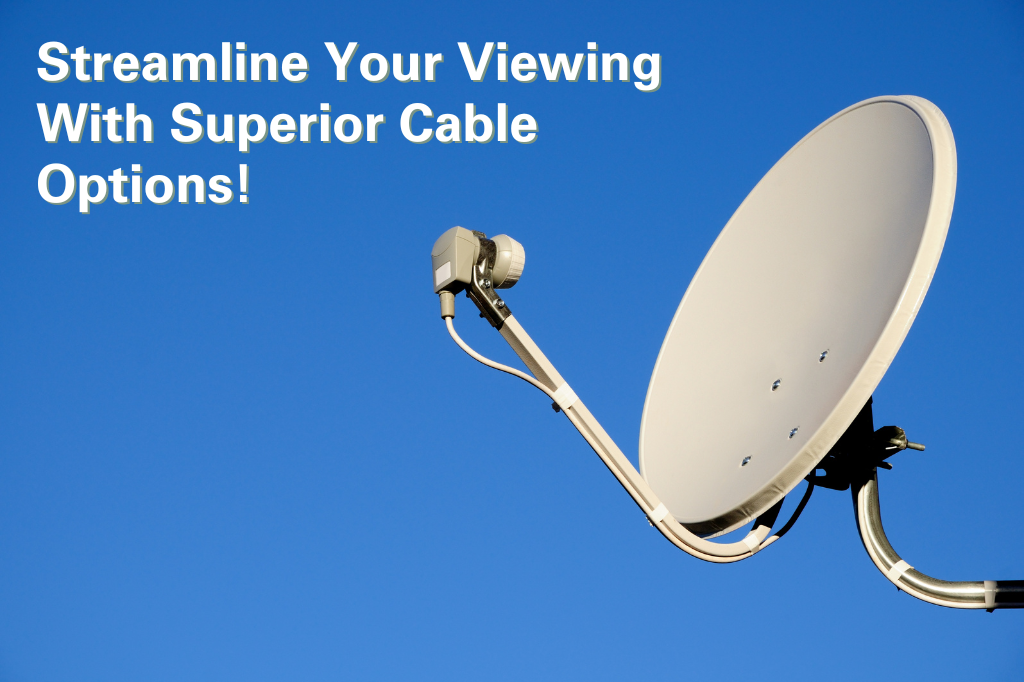Choosing Between Cable and Satellite TV Services:
Introduction:
When it comes to home entertainment, cable and satellite TV services have long been the go-to options for many households. With dozens of channels, high-definition content, and add-on features like DVR, both options offer a great way to enjoy TV programming. But how do they compare? In this blog, we'll dive deep into the differences, advantages, and disadvantages of the best cable and satellite TV services, helping you make an informed decision.
Cable TV Services: What You Need to Know
Cable TV services use a network of underground coaxial or fiber-optic cables to transmit signals to your home. This type of service is generally known for its stable connection, as it is not affected by weather conditions, unlike satellite TV.
Best Cable TV Providers in 2024
Xfinity Xfinity by Comcast is one of the most popular cable TV providers in the United States. Offering various channel packages and excellent bundling options with internet and phone services, Xfinity provides flexibility in plans that can suit different household needs. Xfinity's DVR, called X1, allows users to stream shows, access apps like Netflix, and even control the TV using voice commands.
Spectrum Spectrum is another major player in the cable TV market. Known for its competitive pricing and lack of contracts, Spectrum offers over 200 channels, including sports, news, and entertainment. Their DVR is capable of recording multiple shows at once, and their on-demand library is extensive.
Cox Cox offers customizable packages, allowing customers to pick and choose their channels. They have a robust DVR service, called Contour, which integrates well with streaming apps. Cox is also known for excellent customer service and a reliable connection.
Optimum Optimum provides a variety of TV plans, including packages with premium channels like HBO and Showtime. Their Altice One device integrates TV, DVR, and streaming apps, creating a seamless experience. Optimum is a great choice for those looking for a user-friendly interface and decent channel selection.
Pros of Cable TV
- Stable Connection: Cable TV is less affected by external factors like weather, which ensures consistent viewing quality.
- Bundling Options: Cable companies often offer bundles with internet and phone services, which can save money.
- Wide Availability: Most urban and suburban areas have access to cable services, making it widely available.
Cons of Cable TV
- Higher Monthly Costs: Compared to satellite services, cable TV tends to have higher pricing, especially for premium channels.
- Limited Availability in Rural Areas: Cable infrastructure may not be available in remote or rural areas.
- Fees and Equipment Charges: Many cable providers charge fees for equipment like DVRs or cable boxes.
Satellite TV Services: What You Need to Know
Satellite TV services transmit signals from satellites in space directly to a dish installed at your home. This method allows access to TV in rural or remote areas where cable infrastructure is not available.
Best Satellite TV Providers in 2024
DIRECTV DIRECTV is the largest satellite TV provider in the U.S. It offers a wide range of channels, including live sports, movie channels, and premium content. DIRECTV’s Genie HD DVR is one of the best in the industry, capable of recording up to five shows at once. The service also includes access to streaming apps like HBO Max and Disney+.
DISH Network DISH Network is known for its affordable packages and excellent customer service. DISH offers a Hopper 3 DVR that can record up to 16 channels simultaneously, making it ideal for large families or TV enthusiasts. DISH's channel lineup includes a wide range of entertainment, sports, and news.
Pros of Satellite TV
Wide Coverage: Satellite TV is available almost everywhere, even in areas where cable providers don’t reach.
Affordable Packages: Satellite providers often offer lower-cost packages with more channels compared to cable.
High-Quality HD and 4K Programming: Satellite services typically offer excellent picture quality and access to 4K content.
Cons of Satellite TV
Weather-Dependent: Satellite signals can be disrupted by bad weather, such as heavy rain or snow, which may cause signal loss.
Long-Term Contracts: Many satellite TV providers require long-term contracts with hefty cancellation fees.
Installation and Equipment Costs: Setting up a satellite dish and installing the necessary equipment can be costly, although some providers offer promotions to waive these fees.
Key Differences Between Cable and Satellite TV
When choosing between cable and satellite TV, it's essential to understand how they differ in various aspects:
Signal Transmission
- Cable TV relies on wired infrastructure, which provides stable service but is limited in availability.
- Satellite TV uses wireless transmission via satellites, making it accessible in rural and remote areas but vulnerable to weather conditions.
Channel Packages
- Cable TV providers offer customizable packages with premium channel add-ons, but often at a higher price.
- Satellite TV providers tend to offer more channels, including international options, at competitive prices.
Installation and Equipment
- Cable TV typically requires a simple cable box, and some providers offer self-installation options.
- Satellite TV requires the installation of a dish, which might require professional setup, leading to higher initial costs.






Comments